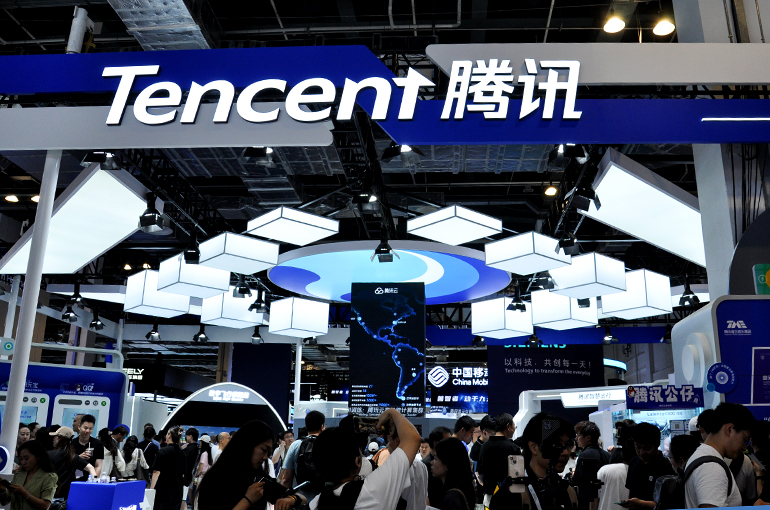 Tencent’s Third-Quarter Profit Jumps 19% on Gaming, Advertising, and AI Gains
Tencent’s Third-Quarter Profit Jumps 19% on Gaming, Advertising, and AI Gains(Yicai) Nov. 14 -- Chinese technology and entertainment giant Tencent Holdings reported a 19 percent jump in third-quarter profit because of higher gaming revenue, a rebound in advertising, and faster payoffs from its investments in artificial intelligence.
Net profit was CNY63.1 billion (USD8.9 billion) in the three months ended Sept. 30, the Shenzhen-based company said in a financial report released late yesterday. Revenue climbed 15 percent to CNY192.9 billion (USD27.2 billion).
“We achieved solid revenue and earnings growth, reflecting healthy trends across games, marketing services, and fintech and business services,” Pony Ma, chairman and chief executive, said during Tencent’s earnings conference call.
“Our strategic investments in AI are benefiting us in business areas, such as ad targeting and game engagement, as well as in efficiency enhancement areas, such as coding, and game and video production,” Ma noted.
Tencent’s shares [HKG: 0700] closed 2.3 percent lower at HKD641 (USD82.49) each in Hong Kong today. The stock has gained 54 percent since the end of last year.
Domestic gaming revenue rose 15 percent to CNY42.8 billion, largely thanks to new games and increased earnings from evergreen titles, while overseas gaming income soared 43 percent to CNY20.8 billion, powered by Supercell titles and contributions from newly consolidated studios.
Revenue from marketing services climbed 21 percent to CNY36.2 billion, lifted by higher advertising impressions, stronger user engagement, increased ad load and better effective cost per milles, helped by Tencent’s AI-powered ad targeting.
Tencent deployed more advanced AI models to enhance ad ranking and conversion across Video Accounts, Mini Program, and Weixin Search, President Martin Lau said on the call.
Management also highlighted strong momentum in Video Accounts -- a feature within Tencent’s WeChat social media platform that allows users to create and view short videos -- noting fast growth in advertising and e-commerce gross merchandise volume, as vendors increasingly adopt short-form video formats for product discovery.
Revenue from fintech and business services grew 10 percent to CNY58.2 billion. Demand for cloud services rose, driven by recovering activity among internet clients and the growing need for AI training and inference, according to Lau.
Overseas, Tencent continues to deploy top-tier graphics processing unit accelerators, such as A100 and H100, in its cloud and gaming operations. In the Chinese mainland, growth was limited by chip supply dynamics.
Tencent's capital expenditure dropped 24 percent to CNY13 billion in the quarter from a year earlier. The topic was heavily discussed on the earnings call, with management clarifying that the decline does not reflect a strategic shift but rather a change in the supply of AI chips.
"We have maintained a sizable reserve of top accelerators," Lau said, adding that capacity remains “adequate for ongoing training runs.”
Despite shrinking capital expenditure, research and development spending surged nearly 28 percent to CNY22.8 billion. Management attributed this largely to more investment in AI-related projects and personnel.
The ecosystem for Weixin, as WeChat is known in Chinese, continued to expand in the period, with monthly active users exceeding 1.4 billion. AI-driven enhancements to Video Accounts, Mini Programs, and Weixin Search support higher commercial activity, according to management.
"We are upgrading the team and architecture of our HunYuan foundation model, whose image and 3D generation models are now industry leading," Ma said. "As HunYuan's capabilities continue to improve, our investment in growing Yuanbao adoption, and our effort in developing agentic AI capabilities within Weixin, will gain further traction.”
Tencent is integrating the Yuanbao assistant into comment and search functions to summarize content and boost interaction, management noted. In the long term, the company aims to build agentic AI experiences within Weixin to automate tasks, such as product selection and after-sales communication.
During the conference call, Lau confirmed ongoing discussions with Apple over in-app payments for Weixin, describing the talks as "constructive." Most revenue from Mini Games comes from in-app purchases rather than in-app advertising, he said.
Looking ahead, Tencent's management expects continued growth in advertising and international gaming revenues, supported by increased commercial activity in Video Accounts and Mini Programs, improving cloud demand, and sustained investment in AI.
The company plans to further optimize operational efficiency, control spending, and focus on long-term franchise development in global gaming, Lau pointed out.
Editor: Futura Costaglione